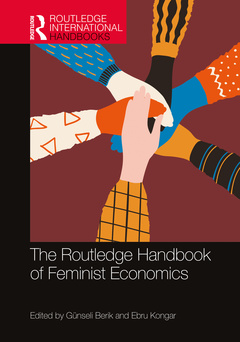The Routledge Handbook of Feminist Economics Routledge International Handbooks Series
Coordonnateurs : Berik Günseli, Kongar Ebru

The Routledge Handbook of Feminist Economics presents a comprehensive overview of the contributions of feminist economics to the discipline of economics and beyond.
Each chapter situates the topic within the history of the field, reflects upon current debates, and looks forward to identify cutting-edge research. Consistent with feminist economics? goal of strong objectivity, this Handbook compiles contributions from different traditions in feminist economics (including but not limited to Marxian political economy, institutionalist economics, ecological economics and neoclassical economics) and from different disciplines (such as economics, philosophy and political science). The Handbook delineates the social provisioning methodology and highlights its insights for the development of feminist economics. The contributors are a diverse mix of established and rising scholars of feminist economics from around the globe who skilfully frame the current state and future direction of feminist economic scholarship.
This carefully crafted volume will be an essential resource for researchers and instructors of feminist economics.
Part I: Introduction 1. The Social provisioning approach to feminist economics: The unfolding agenda Part II: Core concepts and frameworks 2. Feminist economics challenges to development theory and policy: A historical approach 3. Feminist political economy 4. Feminist institutional economics 5. Conceptualizing patriarchal systems 6. Feminist ecological economics 7. Capabilities approach 8. Human rights and feminist economics 9. Care work 10. Three faces of agency in feminist economics: capabilities, empowerment, and citizenship 11. Beyond separative and soluble selves 12. Intersectional identities and analysis Part III: Methods, Methodology and Measurement 13.Feminist use of quantitative methods 14. Feminist use of qualitative/interpretive methods 15. Time allocation and time-use surveys 16. Measurement of well-being Part IV: Resources for Provisioning 17. The feminization of the labor force and five associated myths 18. Gender discrimination in the US labor market 19. Contingent work and the gig economy 20. Labor markets and informal work in the Global South 21. International trade and women workers in the global South 22. Rural women’s livelihoods and food security in Africa 23. Global migration and care chains 24. Sex work and trafficking 25. Women’s work in post-reform China 26. Market reform in transition economies 27. Environmental resources and gender inequality: use, degradation, and conservation 28. Poverty 29. Family formation in the US and Western Europe 30. Gender division of labor among couples 31. Intra-household decision making and resource allocation 32. Assets, wealth and property rights in the global South 33. Intimate partner violence 34. Reproductive health and economic empowerment Part V: Institutions and Policies 35.Gender and economic growth 36. Care and the macroeconomy 37. Gendering the analysis of economic crises 38. Degrowth 39. Care regimes in the European Union 40. The fragmented state of work-family policies in the US 41. Care policies in the Global South 42. Collective bargaining and unions in the US 43. The quest for inclusion in economics in the US: Fifty years of slow progress Part VI: International Governance and Social Provisioning 44.Group-based financial services in the global South: Evidence on social efficacy 45. Sustainable Development Goals: Reflections from a feminist economics perspective 46. Global social policy 47. Gender budgeting 48. Smart economics 49. International labor standards and tripartism 50. Cooperatives
Günseli Berik is Professor of Economics at the University of Utah, USA. Her research and teaching are in the fields of development economics, gender and development, feminist economics, and political economy of ethnicity, gender, and class. Her latest book is Gender, Development, Globalization: Economics as if All People Mattered (2016), coauthored with Lourdes Benería and Maria Floro. She served as Editor of Feminist Economics from 2010 to 2017 and as consultant for the ILO, UNDP, UNRISD, UN Women, and the World Bank. Recently, she worked with the UNDP and UN Women in the development of new gender equality and women’s empowerment indices.
Ebru Kongar is Professor of Economics at Dickinson College, USA. Her research focuses on the gendered time-use and labor market outcomes of macroeconomic developments, such as deindustrialization, offshoring, and the Great Recession in the US economy. She is Associate Editor of Feminist Economics and Research Associate at the Gender Equality and the Economy Program of Levy Economics Institute of Bard College. Her latest book is Gender and Time Use in a Global Context (2017), co-edited with Rachel Connelly.
Date de parution : 01-2023
17.4x24.6 cm
Date de parution : 05-2021
17.4x24.6 cm
Thèmes de The Routledge Handbook of Feminist Economics :
Mots-clés :
Social Reproduction; UN; Feminist economics; Unpaid Care Work; care work; Gender Equality; feminist theory; feminism; Women’s Labor Force Participation; intersectionality; Gender Wage Gap; time allocation; Social Protection Floors; time use survey; Women’s Increased Labor Force; household economics; Gender Wage Inequalities; household decision-making; Gender Pay Gap; female employment; Gdp Growth; Social Provisioning Processes; domestic work; SEWA; wage differentials; Unpaid Work; work-life balance; Violate; work-life policy; Chronic; fertility; Gender Budget Analysis; childbearing; Feminist Economics Literature; female education; Paid Care Work; social provisioning; Genuine Progress Indicator; gender violence; CEDAW; economics of marriage; Work Family Policies; Low Women’s Labor Force; Gender Equality Indexes



